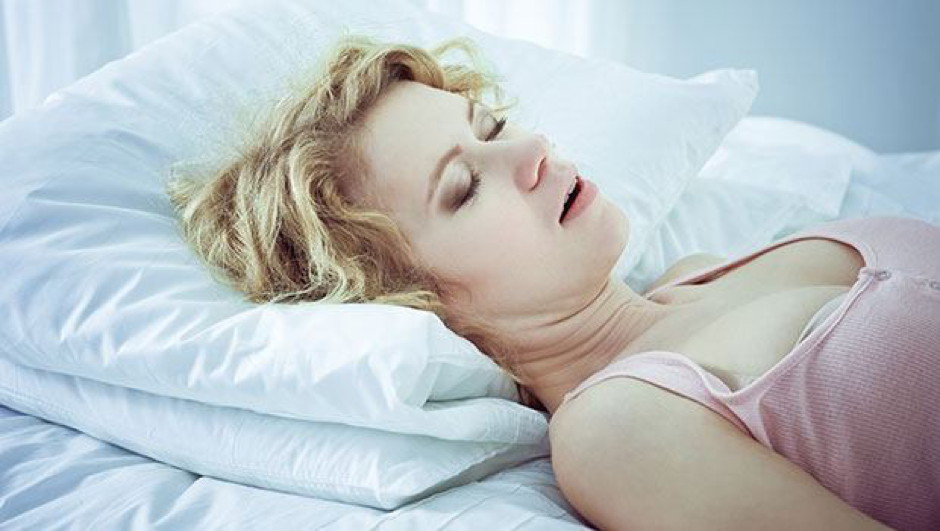


Your lining of mouth has 3 pairs of salivary glands-the parotid, submandibular and sublingual glands. Apart from these, hundreds of little glands are present beneath the lining of your oral cavity. Still you may wake up with a dry mouth, part of which is due to the fact that no saliva is produced while you are asleep. There are certain other factors that also contribute to dry mouth when you wake up in the morning.
The function of saliva produced is to keep your tongue moist for moistening food and making its swallowing easier. You produce approximately three pints of saliva every day. Its antibacterial properties help in guarding against infections. Saliva also helps in protecting the enamel of your teeth from acid containing foods.

Dry mouth, also known as xerostomia may be caused due to snoring. Regular snoring, which does not result due to sleep apnea is often caused by upper airway obstruction that causes you to sleep with open mouth. Since no saliva is produced during sleep, the air that moves in and out while you snore dries the mucous membrane lining your oral cavity.
Nasal congestion (swelling) and accumulation of mucus can block the nasal passages and make you breathe through the mouth. This dries the saliva in your mouth and leads to dryness of mouth. This can occur due to allergies or due to a deviated nasal septum.
During sleep apnea, your breathing is stopped for a short duration (10 or more seconds) while you are sleeping. Sleep apnea is commonly associated with loud snorting and snoring as there is a struggle to breathe. The most common type of sleep apnea is the obstructive sleep apnea. In this type, there is relaxation of your throat muscles, which blocks your airway.
Sleep apnea may result in sleep deprivation, which can cause symptoms of poor concentration, daytime sleepiness, slow reflexes and a raised risk of accidents. The risk of developing stroke, diabetes, high blood pressure and heart disease is also increased if your sleep apnea is not treated. In all types of sleep apnea, one of the major symptoms is dry mouth at night. Complex sleep apnea and central sleep apnea are serious medical illnesses which require tests for diagnosis; hence, if you have symptoms of sore throat and dry mouth upon constantly in the morning, you should visit a physician.
Dry mouth may occur as a result of side effects of certain nonprescription and prescription medicines. These medicines include medicines used to treat anxiety, depression, pain, cold and allergies (decongestants and antihistamines), acne, obesity, epilepsy, diarrhea, hypertension (diuretics), nausea, urinary incontinence, psychotic disorders, Parkinson’s disease and asthma. Dry mouth may also occur as a side effect of sedatives and muscle relaxants.
The salivary glands can get damaged due to certain medical treatments reducing the quantity of saliva secreted. For instance, radiation treatment to head and neck region and chemotherapy for cancer can damage salivary glands.
Dry mouth may occur as a side effect of certain diseases such as HIV/AIDS, Sjogren’s syndrome, diabetes, Alzheimer’s disease, cystic fibrosis, anemia, hypertension, rheumatoid arthritis, stroke, mumps and Parkinson’s disease. The secretion of saliva can also be slowed down by aging and certain cancers.
The symptom of dry mouth can also result from nerve damage to the area of head and neck due to surgery or an injury.
Chewing and smoking tobacco may affect the quantity of saliva you secrete and worsen dry mouth.
Treatment of dry mouth is focused on treating the cause. If you feel that the cause is a medicine, discuss it with your physician; they may either adjust the dosage or change the medicine. Your physician may prescribe a medicine called Salagen, which increases the production of saliva.
You can drink water or rinse your mouth upon waking to relieve dry mouth that is caused due to snoring.
To treat sleep apnea your doctor may recommend using a CPAP (continuous positive airflow pressure) machine while sleeping. This will help in regulating your breathing and reducing breathing through mouth. The mask of CPAP machine covers your mouth and nose and forces steady air flow into your air passages. This helps keep them open while you are asleep.
To relieve dry mouth you can do the following: